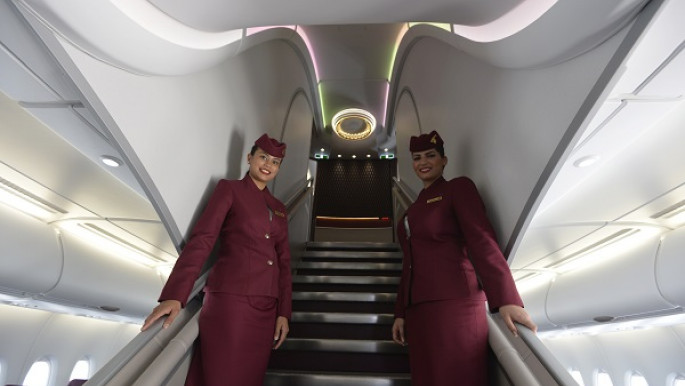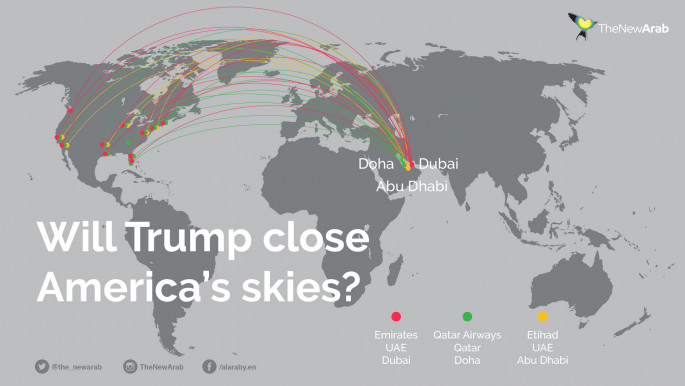Will Trump close America's skies to Arab Gulf carriers?
The tycoon-turned-POTUS has long decried what he thinks is the bad quality of services of US airlines and the state of disrepair of America's airports compared to the glitzy airlines and world-class air terminals of the oil-rich Arabian Gulf, from Dubai to Doha.
But Trump's promises to restore America's glorious airline era -- the time of Howard Hughes and Pan am -- like all his protectionist ambitions, could well come at the expense of those competing with American firms, fairly or otherwise.
In a meeting with the bosses of major US airlines and airport executives on Thursday,
Airline CEOs expressed support for Trump's tax and regulatory cut agenda during the meeting, which was attended by Oscar Munoz of United Airlines, Ed Bastian of Delta Airlines and Gary C. Kelly of Southwest Airlines.
President Donald Trump acknowledged to the executives that US carriers were under pressure from foreign airlines.
"They come with big investments, in many cases those investments come from their governments, but they are still big investments," Trump alleged.
 |
A long-time allegation pushed by US airlines holds that Gulf carriers are subsidised by their governments, a claim the carriers strongly deny |  |
Trump was referring to a long-time allegation pushed by US airlines that Gulf carriers are subsidised by their governments, a claim the carriers strongly deny.
 |
| Competetion between 'superior' Gulf carriers and US legacy airlines has led to protracted rivalry [AFP] |
According to Reuters, Delta, American Airlines Group Inc, United Continental Holdings Inc are pushing for the new US administration to denounce US 'Open Skies' agreements with three major Gulf carriers, Emirates, Qatar Airways and Etihad, because of this alleged government subsidy.
The three airline - Emirates, Qatar Airways and Etihad - have denied they receive any state subsidies.
American Airlines, Delta and United had been urging the US administration to prevent Gulf carriers from adding extra routes to the US, pending a review of Open Skies agreements. To this end, they formed a lobbying group, the Partnership for Open & Fair Skies coalition, together with some unions in the aviation industry.
But complicating the task of the legacy airlines, other US carriers and business leaders are fierce defenders of Open Skies, not least because the Gulf carriers are among the world's top purchasers of American-made planes and thus big investors in US jobs.
Before the weekend, the US Travel Association issued an open letter to Secretary of State Rex Tillerson calling on the Trump administration to affirm its support of the country’s Open Skies aviation agreements, arguing that the policy aligns with the president’s stated priorities of supporting domestic jobs, correcting the US trade imbalance, and reducing government regulations.
"By reducing government interference in air travel, [Open Skies] agreements have led to hundreds of thousands of new American travel and manufacturing jobs, billions in US economic growth, lower airfares for travelers, more flights to airports to and beyond major gateways, and new opportunities for US airlines,” US Travel Association President and CEO Roger Dow wrote in the letter.
"While their arguments are couched in compelling terms, the Big Three airlines are not seeking a level playing field to compete,” Dow wrote. “Instead, they are lobbying for government intrusion that would benefit themselves, but hurt American manufacturing jobs, threaten US economic growth and undermine US national security interests."
 |
Recently, Emirates accused Delta Air Lines of harming its operations by refusing it a spare part for its aircraft in the United States |  |
Unholy rivalry?
Recently, Emirates accused Delta Air Lines of harming its operations by refusing it a spare part for its aircraft in the United States.
According to Reuters, an Emirates flight from Seattle was delayed by more than six hours on February 2, while it searched for the minor hydraulic part that needed replacing.
The part was initially fitted to the Emirates Boeing 777 by local engineers who had obtained the part from Delta, the Emirates spokeswoman said.
However, at alleged the request of a "senior manager" at Delta's headquarters in Atlanta the part was removed and returned just before passengers boarded resulting in a further delay, the spokeswoman said.
Delta confirmed the incident, but said "this was the last spare part of its kind in our Seattle inventory and, according to policy, was kept on hand to ensure coverage for Delta's own operation".
Delta denied it had tried to obstruct the flight.
 |
Not just the US, but the EU may also be moving to curb competition from Gulf carriers |  |
Trump's options
Not just the US, but the EU may also be moving to curb competition from Gulf carriers. The European Commission, according to a draft proposal seen by Reuters, is set to revamp a law enabling it to impose duties on non-EU airlines or suspend their flying rights if it finds they have harmed European airlines.
 |
| Gulf carriers have hauled millions of passengers to US destinations [Click to enlarge] |
This could be done by tackling alleged unfair business practices by foreign airlines and their governments which cannot be addressed through open skies agreements, including alleged government subsidies or favorable treatment.
Donald Trump may well follow suit. In addition to cutting taxes (which may amount to a subsidy itself), his options include a complete US withdrawal from Open Skies and a ban on flying some individual routes, according to Dubai-based journalist Frank Kane.
There is yet no indication of this. Trump might instead decide to ignore lobbying by legacy airlines and maintain the status quo. Trump's immigration ban, "which does not apply to nationals of the...UAE, Qatar and Saudi Arabia, is a signal that he can be selective in his policy toward the Middle East, especially when there are Trump business interests at stake," Kane wrote in Arab News last week.
 |
Qatar Airways welcomes an investigation by an independent third party into the claims of unfair subsidies. |  |
Gulf carriers support millions of US jobs
At any rate, the powerful Gulf carriers may be able to successfully resist such measures in American and European courts. They can also move to influence policy.
Recently, Gulf airline executives spoke to US media to argue their case to the American public.
"We really want to create more jobs in the US and support the economy in the US," Emirates chairman Sheikh Ahmed bin Saeed Al Maktoum told CNNMoney.
"We carry nearly 4,000 people into the U.S. everyday, we invested 140 billion [US dollars] and supported over a million peoples' jobs."
"[Trump] should try to support us because we always... bring America first by ordering American manufactured goods for our airlines, contrary to what the others are doing -- placing large airplane orders with European, Brazilian and Canadian manufacturers," Qatar CEO Akbar Al Baker told CNNMoney in turn.
Al Baker said he would welcome an investigation by an independent third party into the claims of unfair subsidies.
"We are publishing our accounts, we are not running our airlines the way we are perceived to run [them] and we have open books and President Trump is most welcome to appoint a special counsel to look at this," he said.
In an e-mail statement to The New Arab, an Emirates spokesperson declined to comment on the US president's possible next steps, saying the company would not speculate on "actions that the Trump administration may or may not take on aviation policy."
But the statement recalled that Emirates has carried more than 16.1 million passengers on US flights to US gateways -- currently numbering 11 -- since launching services to New York in 2004.
Emirates SkyCargo "also transports up to 650 tons of US exports each week – including auto parts from New York, apples and cherries from Seattle, and oil and gas equipment from Houston – stimulating trade and opening new markets for American businesses across the Middle East, Africa and Asia," it added.
By the time of publication, The New Arab could not reach Qatar Airways or Etihad representatives for comment due to weekend closure in the Gulf region.





 Follow the Middle East's top stories in English at The New Arab on Google News
Follow the Middle East's top stories in English at The New Arab on Google News


